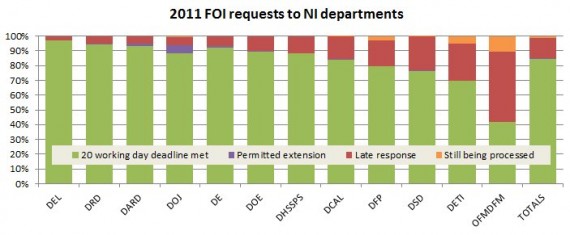This morning the Information Commissioner’s Office (ICO) announced four public bodies which will be monitored between January and March in 2013 “over concerns about the timeliness of their responses to Freedom of Information requests”.
The four public bodies were selected from the thousands of public bodies across the UK that fall under the ICO’s remit for FOI: Wirral Metropolitan Borough Council; two Westminster departments, Department for Education, Department for Work and Pensions; and the Office of the First Minister and Deputy First Minister (OFMDFM) in Northern Ireland.
OFMDFMs own report into FOI in Northern Ireland for 2011 illustrates the scale of the problem. I’ve charted the performance of the departments using the figures in section 6, table 3.
Just 42% of FOI requests sent to OFMDFM (70 out of 168) were fulfilled within the statutory twenty day deadline. DEL with a similar number of requests had a 97% success rate, while departments like DOE and DCAL with two or three times the volume of requests returned more than 80% within the deadline.
Investigative journalism website The Detail keep blow by blow accounts of their own battles with NI government departments – often OFMDFM – to obtain information under FOI.
Westminster’s Justice Committee conducted a consultation and then published a report into “Post-legislative scrutiny of the Freedom of Information Act 2000”. The full report (PDF) is available to read online, along with the oral and written evidence (PDF) and additional evidence (PDF).
Given the scrutiny on OFMDFM, it is worth looking at the written evidence that the combined Northern Ireland Civil Service departments submitted to the Justice Committee.
2. Freedom of Information Annual Reports (published for each calendar year since 2005) show that the departments which compose the NI Civil Service received 18,353 requests for information between 2005 and 2010 inclusive.
Most of the requests were received from members of the public. The media and the business sector were the next most prominent sources of requests.
Over the six years, the departments responded to 91% of requests within the statutory time limits, and in 74% of cases the information requested was disclosed in full … [Ed – note that the 2011 performance was worse than average, and OFMDFM’s handling times lag far behind all other departments.]
652 internal reviews were conducted, and 77 complaints were made to the Information Commissioner, who has issued 57 Decision Notices involving the departments. Only five cases have been escalated to the Information Tribunal.
6. … Ordinary members of the public continue to be the biggest category of requester, which suggests that the process of submitting requests is sufficiently straightforward and comprehensible … It should be noted that a significant—though unquantified—number of requests are submitted by members of staff. This is not always interpreted as a good trend, as the requests tend to focus narrowly on the interests of individuals and not on the more strategic or organisational issues.
8. Several departments comment that the FOI Act has proved to be a useful instrument for raising the profile of records and information management, for encouraging better record keeping, and for increasing awareness of the value in managing information as a key corporate asset.
The submission notes:
5. However, the Act suffers from a number of flaws …
Amongst these, the NICS departments find that “range of activities that can be taken into consideration in determining cost is very limited” and since the NI departments are separate legal entities under the FOI Act, they suffer from round-robin requests (targeting multiple/all departments with the same request). While the overall cost of the (up to) twelve separate responses may exceed the £600 cost limit, each request has to be costed individually. NICS alleged discrimination:
13 … the devolved administration in Northern Ireland is at a clear disadvantage compared to the administrations in Scotland and Wales: a round-robin request sent to the NI Departments generates twelve separate responses, whereas a request to either the Scottish government or the Welsh government generates one response.
NICS made four recommendations in their consultation response:
Extend the range of activities that can be counted towards the cost limit of £600;
Allow the NI Civil Service to aggregate the costs to individual Departments of responding to round-robin requests;
The section 12 provisions in relation to the introduction of fees charged to applicants for complying with requests need revision. FOI legislation is within devolved competence but the way in which the power to introduce fees is framed suggests that only the Secretary of State may make the necessary regulations. Therefore, section 12 should be amended, so that the NI Departments can also make fees regulations; and
Levy a reasonable nominal fee before a request is accepted; and strengthen the section 8(1) provisions, with a view to obtaining identity information from requesters.
Around the issue of activities that can be counted towards the cost limit, the Justice Committee concluded that “developing a methodology whereby subjective activities such as reading and consideration time could be included in the 18 hour time limit does not seem to us to be a feasible proposition” but suggested a “marginal decrease in the 18 hour limit” to 16 hours.
On charging an up-front fee, the Irish FOI model was examined in the committee’s report, they concluded “fees at a level high enough to recoup costs would deter requests with a strong public interest and would defeat the purposes of the Act” and “future reconsideration of the economic argument for charging would need significantly better data on the number of requests made under the Act and the costs incurred in responding to them”.
No mention made in the Justice Committee’s report about supported for devolving FOI charges to Northern Ireland departments or the Assembly.
Given the spotlight being shone on OFMDFM today, it is notable that NI Civil Service departments made no plea for an increase in the length of time allowed to process and fulfil Freedom of Information requests.
Sam McBride in the News Letter has comment from Jim Allister.
Alan Meban. Tweets as @alaninbelfast. Blogs about cinema and theatre over at Alan in Belfast. A freelancer who writes about, reports from, live-tweets and live-streams civic, academic and political events and conferences. He delivers social media training/coaching; produces podcasts and radio programmes; is a FactCheckNI director; a member of Ofcom’s Advisory Committee for Northern Ireland; and a member of the Corrymeela Community.
Discover more from Slugger O'Toole
Subscribe to get the latest posts to your email.

